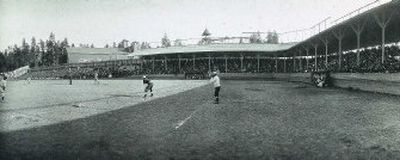The Babe goes deep

As Spokane’s boys of summer approach the playoffs at Avista Stadium, let’s go back in time to the old Natatorium Park grandstand and the most storied day in its 45-year history: The day Babe Ruth hit a home run. The date was Oct. 17, 1924, and it was described by a reporter for The Spokesman-Review as far superior to “circus day, Christmas and Thanksgiving” all rolled into one.
The Natatorium Park grandstand – on the east bank of the Spokane River across from the present Spokane Falls Community College – was Spokane’s showcase ballpark.
On the day in 1924 when Ruth and fellow Yankee slugger Bob Meusel arrived for a barnstorming tour, it was jammed with about 1,700 spectators. That did not include the hundreds, if not thousands, of kids perched on the outfield fence. A Spokane police officer had the thankless job of patrolling the fence.
“He worked so hard and it was so futile,” wrote the S-R reporter. “He walked along the fence and told kids hanging to the top to jump down. ‘Get off there!’ he would shout to a group. The heads would disappear and he would walk to another group. The heads would reappear. … The best way to get rid of the policeman was to duck and hang on until he passed.”
The game itself was an exhibition, designed for one purpose only: To allow spectators a chance to see Meusel and Ruth knock some long ones over the fence. The two Yankee stars played on opposing teams made up of local players – but nobody cared about the score.
For the first five innings, the two sluggers merely had a handful of singles and doubles between them.
“The crowd was worried,” reported the S-R.
Then in the sixth inning Meusel blasted one over the left field fence. Ruth, however, kept hitting long blasts just foul.
Finally, in the eighth inning, after what the S-R reported as about “six balls called,” Ruth smashed a towering shot over the centerfield sign.
“The crowd stood and cheered,” reported the S-R. “A fat man spilled his bag of peanuts and waved his hat. A woman who graces social affairs stood and shouted at the top of her voice. A boy in an expensive fur-trimmed overcoat grinned. A kid with a torn sweater and dust-smudged face danced and grinned.”
The next batter tried to come up to the plate, but the game was effectively over. The field was “too full of boys, anyhow.”
The kids eventually piled onto streetcars, clutching baseballs and scraps of paper signed by the Bambino himself.
The ballpark itself died in 1945, three years before the Babe himself died. The Natatorium grandstand had been supplanted in 1936 by Ferris Field, near the present Playfair Race Course, and had sat unused and deteriorating for years.
On Dec. 19, 1945, Spokane firefighters burned the old Natatorium grandstand down as a training exercise. Those fence-straddling boys, now men, no doubt felt a pang of nostalgia.
The Lewis and Clark Report: Two hundred years ago this week, the expedition was reaching the dispirited conclusion that the Salmon River was impassable. So they began making plans to trudge north, over Lost Trail Pass to the Bitterroot River.
Meanwhile, Meriwether Lewis noted that one of the Indian women who had been helping with the baggage suddenly disappeared. An hour later, she showed up, having just given birth to a “newborn babe.”
“(She) passed us on her way to the camp, apparently as well as she ever was,” wrote the astonished Lewis.
He wrote that the “facility and ease” with which Indian women bring forth their children is a “gift of nature.”
100 years ago in Spokane: Spokane was giddy with excitement over the opening of a grand new building: The Masonic Temple.
That would be the same Masonic Temple that still looms majestically over Riverside Avenue, just west of Monroe.
The opening was solemnly celebrated by a parade of Masons in full regalia, followed by a grand ball, reported breathlessly by The Spokesman-Review as “one of the most elaborate social events ever seen in Spokane.” The paper noted that the new building was “all aglow” with 2,963 electric lights.
In other news, a traveling theatrical troupe fell victim to a local actor’s strike.
The producers had advertised for 75 local “supers” (supernumeraries, or extras) to play a mob of stockbrokers in a “pit” scene. However, during one matinee show, 30 extras walked out when they learned they would be paid only 35 cents.
“We were promised 50 cents apiece,” said one disgusted extra. “… This is the first time that a manager ever tried to hire supers in Spokane for less than four bits.”